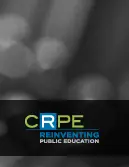This report was written in anticipation of the passage of House Bill 1834, a charter school statute considered and ultimately rejected by the Pennsylvania legislature in the fall of 1996. Despite this fact, we have published the report to advance understanding of the Pennsylvania initiative and because the information and advice contained herein has broader application to charter schools and the charter movement.
This report describes the capabilities applicants must possess to operate the charter schools created by House Bill 1834, the proposed Charter School Act under consideration in the Pennsylvania legislature. It is the first of two papers commissioned by the Howard Heinz Endowment to determine the range of demands the legislation would place on charter school applicants and operators, identify the kinds of professional expertise required to meet those demands, assess the availability of such experts, and suggest appropriate means of supplying technical support.
This study builds on RAND/University of Washington (UW) analyses of the needs of individual schools in decentralized school systems, including studies of charter school law, the implementation of the Massachusetts charter school statute, and New American Schools designs; and the results of work on the business side of charter school start-up. It is intended to support individuals and organizations interested in starting charter schools and/or creating a TAA to support implementation of the proposed Pennsylvania charter school statute. It should be of general interest to those following the charter school movement.




